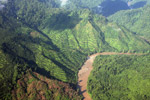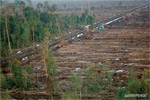World Growth International, a group that lobbies on behalf of industrial forestry and palm oil companies, is clouding the origin of the fires that triggered ‘haze’ air pollution alerts across Singapore and Malaysia last month.
In a newsletter sent out July 2, World Growth claimed “the majority of fires were located either outside forestry or palm oil concessions, or in protected areas”. It cited data from the World Resources Institute (WRI), a non-profit.
But WRI’s analysis shows that, during the peak of the haze crisis, roughly half of the fire alerts in Sumatra occurred inside concessions. The data further reveals that the density of fire alerts inside of concessions was over three times higher than the density of alerts outside of concessions. Since concession holders are legally responsible for preventing and managing fires in their areas, the high number of fire alerts within concessions represents a serious problem for palm oil and timber companies. It certainly does not absolve them for partial responsibility from the fires.
WRI’s interactive map of the forest fires and concessions.
It isn’t the first time World Growth has made questionable claims on industrial forestry. In 2011, the group was called out for using “false and misleading” information on the economic impact of reducing Indonesia’s deforestation rate. In December 2010, Agus Purnomo, Indonesian President Susilo Bambang Yudhoyono’s special assistant on climate change, said World Growth’s chairman Alan Oxley was misrepresenting the objectives of Indonesia’s proposed moratorium on new concessions in primary forest areas and peatlands. In November 2010, the group run by the late Wangari Maathai, the 2004 Nobel Peace Prize winner for her tree-planting campaign in Africa, blasted Oxley for using her name to imply that she supports the large-scale conversion of tropical forests for industrial plantations. And in October 2010, a group of prominent scientists castigated Oxley. In an open letter the scientists identified World Growth International and the associated ITS Global as front groups for the palm oil, timber, and wood-pulp industries.
“A number of the key arguments of World Growth International, ITS Global, and Alan Oxley, represent significant distortions, misrepresentations, or misinterpretations of fact,” said the open letter.

Fate of deforested lands in Riau, 2007-2012
Related articles
Cause of haze? Up to 87% of recent deforestation in fire zone due to palm oil, timber

(06/26/2013) New analysis of land cover in Riau Province reveals the outsized role industrial plantations play in driving deforestation and associated haze. The analysis, conducted by Eyes on the Forest, finds that up to 56% of deforestation in Riau between 2007 and 2012 can be linked to timber plantations for pulp and paper production. The figure for oil palm plantations may be as high as 31%.
Wind, not big increase in forest fires, driving haze in Singapore
(06/26/2013) Wind patterns, rather than a sharp increase in fires, is to blame for the record setting air pollution affecting Singapore and Malaysia, finds new analysis by the World Resources Institute (WRI).
Palm oil companies linked to haze see share prices drop
(06/24/2013) Three firms linked to fires in Sumatra saw their share prices decline since the haze crisis worsened a week ago.
5 RSPO companies linked to haze

(06/24/2013) Five members of the Roundtable and Sustainable Palm Oil (RSPO) will be asked to submit digital maps of their plantations after media reports linked them to fires in Sumatra that are driving the haze across Singapore and Malaysia. The RSPO has given the companies — PT Jatim Jaya Perkasa, Tabung Haji Plantations, Sinar Mas, Kuala Lumpur Kepong, and Sime Darby — 48 hours to submit maps of their plantations in Sumatra and Kalimantan so the eco-certification body can compare them to fire hotspot data from NASA and NOAA.
(06/21/2013) Singapore’s Pollutant Standards Index hit the highest level on record Friday as ‘haze’ driven by fires burning across plantations, peatlands, and forest areas continued to rage across Sumatra. The air pollution gauge touched a record 400 at 11 am local time on Friday, according to the National Environment Agency’s website. The level is considered “very unhealthy” with people advised to ‘minimize all outdoor exposure’ and wear masks when outside.
Palm oil lobby attacks World Bank’s new social and environmental safeguards
(04/18/2011) Groups funded by the palm oil industry lashed out at the World Bank’s new framework to resume lending to the palm oil sector.
Pro-deforestation group calls for weakening of U.S. law against illegal logging
(04/14/2011) A group that lobbies on behalf of forestry conglomerates in Indonesia and Malaysia is calling on the U.S. to roll back legislation intended to fight illegal logging. World Growth International, a Washington D.C.-based group that portrays itself as a humanitarian organization, yet consistently pushes policies that favor industrial forestry interests over those of rural communities, has submitted formal comments to the United States Department of Agriculture, Animal and Plant Health Inspection Service’s (APHIS) review of the implementation of the revised Lacey Act provisions that prohibit trade in illegally logged wood products, including timber and paper.
Gas from ‘fracking’ not climate friendly
(04/13/2011) It appears every time a fossil fuels industry claims its energy is ‘green’ or ‘climate-friendly’, scientists discover this just isn’t so. The most recent culprit is natural gas produced by an already controversial method known as hydraulic fracturing, or fracing, which extracts the gas from shale basins. A new study in Climatic Change has found that the process of fracing is worse than coal over a 20-year period and about equal over 100-years. Coal had long been considered the worst climate offender of all energy options.
New World Growth report contains ‘false and misleading’ information
(03/31/2011) A new report from World Growth International, a lobby group for industrial forestry interests, contains ‘false and misleading’ information on the economic impact of reducing Indonesia’s deforestation rate, says an Indonesian environmental group. The report, released today, claims that reducing deforestation in Indonesia will cost the country 3.5 million jobs annually by slowing expansion in the forestry sector.
Pro-deforestation group criticizes palm oil giant for sustainability pact
(03/24/2011) World Growth International, a group that advocates on behalf of industrial forestry interests, has criticized Golden Agri Resources (GAR), Indonesia’s largest palm oil producer, for signing a forest policy that aims to protect high conservation value and high carbon stock forest and requires free, prior informed consent (FPIC) in working with communities potentially affected by oil palm development. In a newsletter published March 10, World Growth International claimed that GAR’s agreement “could severely hamper the company’s growth” by limiting where it can establish new plantations and says that negotiating with multiple stakeholders “will delay and complicate any investment by the company.” World Growth International concludes by implying that GAR may renege on its commitment. But Peter Heng, Managing Director, Communications and Sustainability at GAR, disagreed with World Growth International’s assessment.
Greening the world with palm oil?

(01/26/2011) The commercial shows a typical office setting. A worker sits drearily at a desk, shredding papers and watching minutes tick by on the clock. When his break comes, he takes out a Nestle KitKat bar. As he tears into the package, the viewer, but not the office worker, notices something is amiss—what should be chocolate has been replaced by the dark hairy finger of an orangutan. With the jarring crunch of teeth breaking through bone, the worker bites into the “bar.” Drops of blood fall on the keyboard and run down his face. His officemates stare, horrified. The advertisement cuts to a solitary tree standing amid a deforested landscape. A chainsaw whines. The message: Palm oil—an ingredient in many Nestle products—is killing orangutans by destroying their habitat, the rainforests of Borneo and Sumatra.
Indonesian climate official: palm oil lobbyist is misleading the public
(12/29/2010) Alan Oxley, a lobbyist for industrial forestry companies in the palm oil and pulp and paper sectors, is deliberately misleading the public on deforestation and associated greenhouse gas emissions, said a top Indonesian climate official.
Nobel Prize winner, anti-poverty group, scientists fire back at logging lobbyist
(11/01/2010) An industrial lobbyist is facing mounting criticism for his campaign to reduce social and environmental safeguards in Indonesia.
Scientists blast greenwashing by front groups

(10/27/2010) A group of prominent scientists has published an open letter challenging the objectivity of World Growth International, an NGO that claims to operate on behalf of the world’s poor, and its leader Alan Oxley, a former trade diplomat who also chairs ITS Global, a marketing firm. The letter, published online in several forums, slams World Growth and ITS Global as a front groups for forestry companies. The scientists note that while the groups have not disclosed their sources of funding, they assert ITS receives funding from Sinar Mas, an Indonesian conglomerate that controls Asia Pulp & Paper (APP), a forest products brand, and Sinar Mas Agro Resources & Technology, a palm oil firm, among other companies.
Misleading claims from a palm oil lobbyist
(10/23/2010) In an editorial published October 9th in the New Straits Times (“Why does World Bank hate palm oil?”), Alan Oxley, a former Australian diplomat who now serves as a lobbyist for logging and plantation companies, makes erroneous claims in his case against the World Bank and the International Finance Corp (IFC) for establishing stronger social and environmental criteria for lending to palm oil companies. It is important to put Mr. Oxley’s editorial in the context of his broader efforts to reduce protections for rural communities and the environment.